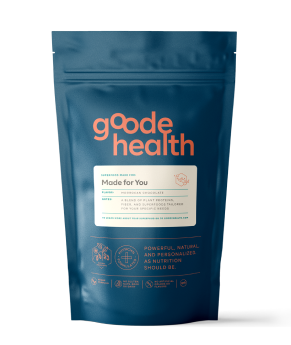Written by: Alyssa Paglia, RD
Not all nutrition shakes are created equal. Unfortunately, hundreds of brands push mass-produced nutrition products filled with empty calories and fillers, all while spending tons of money on social media ads and podcasts. They don’t care if the product is effective, as long as it generates profits. One of the most rewarding aspects of my job as a private practice dietitian is the opportunity to debunk some of these products and prevent my patients from wasting their hard-earned money. I’m going to share with you exactly what I teach my patients to look for when shopping for nutrition products.
Research the company
Who developed the product and what is their background? Was it developed by a serial entrepreneur, businessperson, or influencer? Or was it developed by health experts with proven track records in nutrition sciences? Goode Health was developed by a team of accomplished scientists, physicians, and dietitians dedicated to improving people’s health rather than focusing on corporate profits.
Read the label
You may be familiar with the term “empty calories,” typically used to describe foods high in calories and low in healthy nutrients, such as candy and pop. Sadly, many so-called nutrition shakes are also full of empty calories despite their convincing ads and celebrity endorsements. I won’t name names, but one of the most popular “superfood” shakes on the market consists of 49% empty calories! Consumers are paying a premium price for a product that is essentially half junk. In contrast, Goode Health has the highest nutrient-density of any product on the market, with only 7-17% of calories being empty (depending on the flavor.)
To ensure you’re getting the most value for your money and your health, look for products with high nutrient-density. A nutrient-dense product will have a low amount of empty calories and fillers (e.g. corn syrup, added sugars, gums, carrageenan and other processed ingredients) and an abundance of desirable nutrients like protein, fiber, vitamins, minerals, polyphenols, antioxidants. For example, a nutrition shake that has 250 calories, 7 grams of protein, and 0 grams of fiber likely isn’t a good choice because it is relatively high in calories for the low amount of nutrients it contains. In contrast, 1 scoop of vanilla Goode Health provides 80 calories, 15 grams of protein, 5 grams of fiber, CORE8 micronutrients, and polyphenols. As you can see, there are a lot of nutrients packed into those 80 calories, which makes Goode Health a nutrient-dense product.
Don’t get distracted by long lists of ingredients. More is not necessarily better!
Some brands claim to have 50+ superfoods in their products. However, more often than not, the quantity of each superfood is too small to have any benefits. You’d have to drink a lot of that product to actually receive the health benefits of those superfoods. Unfortunately, many companies list their ingredients as “proprietary” without disclosing ingredient quantities, which makes it difficult to figure out if you’re being duped. I recommend visiting the company’s website to see if they’ve published any scientific studies to back up their claims. If they don’t have any, well… there’s your answer!




